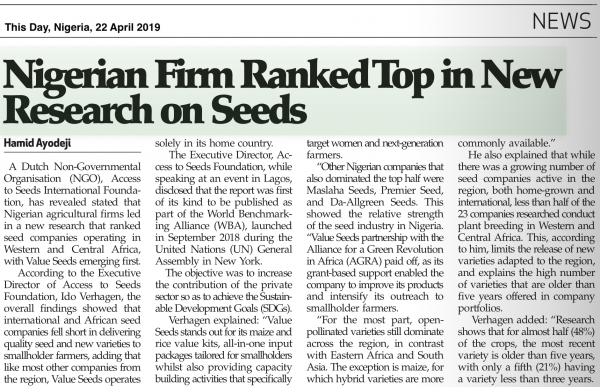A Dutch Non-Governmental Organisation (NGO), Access to Seeds International Foundation, has revealed stated that Nigerian agricultural firms led in a new research that ranked seed companies operating in Western and Central Africa, with Value Seeds emerging first.
According to the Executive Director of Access to Seeds Foundation, Ido Verhagen, the overall findings showed that international and African seed companies fell short in delivering quality seed and new varieties to smallholder farmers, adding that like most other companies from the region, Value Seeds operates solely in its home country.
The Executive Director, Access to Seeds Foundation, while speaking at an event in Lagos, disclosed that the report was first of its kind to be published as part of the World Benchmarking Alliance (WBA), launched in September 2018 during the United Nations (UN) General Assembly in New York.
The objective was to increase the contribution of the private sector so as to achieve the Sustainable Development Goals (SDGs).
Verhagen explained: “Value Seeds stands out for its maize and rice value kits, all-in-one input packages tailored for smallholders whilst also providing capacity building activities that specifically target women and next-generation farmers.
“Other Nigerian companies that also dominated the top half were Maslaha Seeds, Premier Seed, and Da-Allgreen Seeds. This showed the relative strength of the seed industry in Nigeria. “Value Seeds partnership with the Alliance for a Green Revolution in Africa (AGRA) paid off, as its grant-based support enabled the company to improve its products and intensify its outreach to smallholder farmers.
“For the most part, openpollinated varieties still dominate across the region, in contrast with Eastern Africa and South Asia. The exception is maize, for which hybrid varieties are more commonly available.”
He also explained that while there was a growing number of seed companies active in the region, both home-grown and international, less than half of the 23 companies researched conduct plant breeding in Western and Central Africa. This, according to him, limits the release of new varieties adapted to the region, and explains the high number of varieties that are older than five years offered in company portfolios.
Verhagen added: “Research shows that for almost half (48%) of the crops, the most recent variety is older than five years, with only a fifth (21%) having a variety less than three years.
Link to (longer) online article







